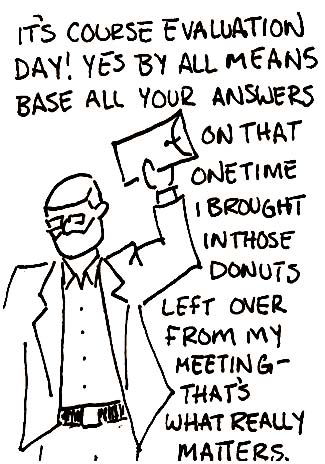Who doesn’t enjoy having power over others? I know I do. Especially when the people over which I have power are, most of the time, evaluating my impeccably crafted, artfully conceived, not-written-the-night-before research papers with an often unforgiving red pen. At the College of William and Mary, professor evaluations grant students, if not power, at least a formal voice.
Often, these evaluations are high-stakes, used to separate the good professors from the bad. When used purely in this way, administrators ignore the biases that inevitably arise from asking students about their professors as well as opportunities for constructive criticism and improvement.
One would hope that these evaluations are taken for what they are: College students answering generic, opinion-driven questions about their professors at the end of the semester. There will be some students who have nothing but praise, others who have nothing but loathing, and many in between. We’d like to think that the method we use to evaluate our professors is driven solely by their ability to effectively teach the material and help us learn, but that isn’t always the case. Sometimes it’s not even intentional; we might really like a professor who is doing a poor job but inflates grades, and we don’t have the heart to give him or her a terrible evaluation. On the flip side, we may give a terrible evaluation out of spite to a challenging professor who has no problem giving out Ds and Fs.
All feelings aside, we may not even realize how much we’ve gained from a professor until we’re forced to recall concepts and ideas in later courses. The best professors help us build a foundation for future learning; they don’t just teach us what we need to know to pass their exams. We may not even know who those professors are until years later.
In order to reach full potential, students’ professor evaluations must be constructive and be conducted more often. At the end of the course, students may not always remember how they felt about a professor’s teaching style or what difficulties they were having months earlier. Evaluations done at the midway point could help professors improve faster, so that current students, as well as the next year’s students, could reap the benefits. In addition, evaluations done at the end could be compared with those done at the midway point. Evaluations could ask whether students found a marked difference in professor quality. If so, in what way? If a student perceived that professor quality went from worse to better, perhaps he was simply being challenged and eventually got used to it. If it stayed bad throughout, perhaps the professor was to blame.
Students taking higher-level courses could also fill out separate evaluations asking whether their previous professors and courses had adequately prepared them to continue their learning. These evaluations would give administrators an idea of how ready students actually were, rather than conjecturing from evaluations done at the end of the year. Higher-level professors could fill these out as well, unless, of course, they would be grading themselves.
No matter how students’ professor evaluations are used, administrators must acknowledge that they are not the whole story. As students, we should have a say in our learning, but we may not always know what’s best for us. To use a word that the Office of Admissions loves, administrators must look at professors “holistically.” This means looking at evaluations but also using more objective ways to determine student learning and professor performance. An holistic view could include test scores, professor experience, grades, peer evaluations and student evaluations.
If administrators are to use students’ evaluations fairly and effectively, they must acknowledge student bias, both intentional and unintentional, and give professors the opportunity to improve their skills, which would benefit everyone.
Email Matt Camarda at mjcamarda@email.wm.edu.


I actually agree with what’s mentioned that says, “…we may give a terrible evaluation out of spite to a challenging professor who has no problem giving out Ds and Fs.”. The reason why rate-my-professor type of evaluations are a failure is that most students are being subjective about their evaluations and therefore do not consider what the real aptitude of the teacher in question. Much work has to be done in order for rate my professor tools can be fully trusted but it’s an important step to helping both teachers and students make learning easier and fulfilling.